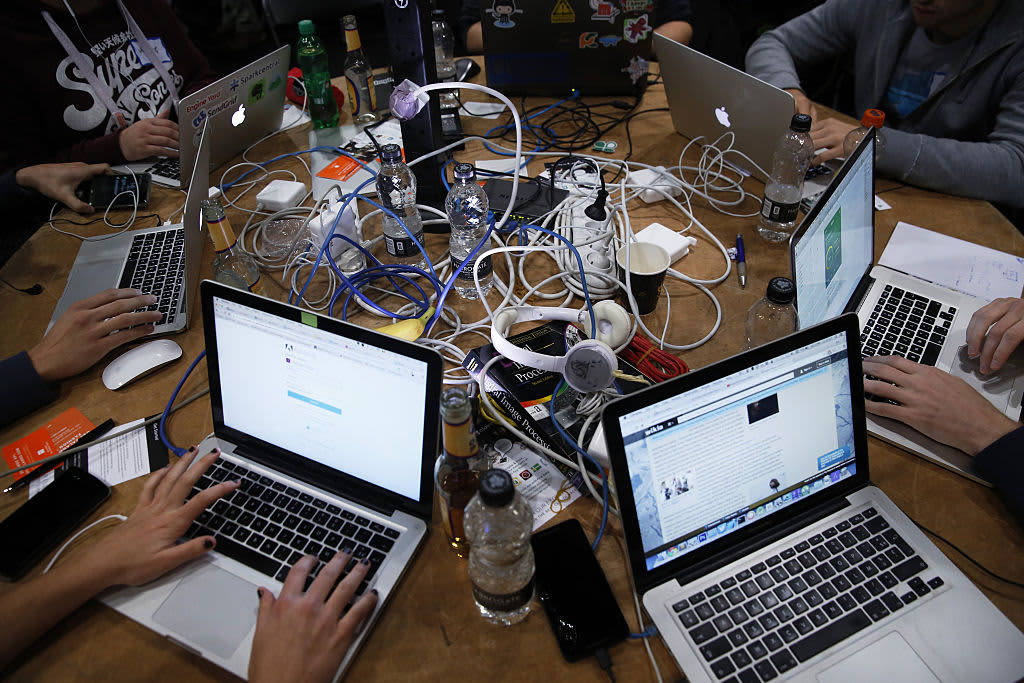
Luke MacGregor | Bloomberg | Getty Images
With higher pay, better benefits and more resilience in a challenging economy, jobs in the fast-growing tech sector are highly sought after positions. Yet, Blacks and Latinos make up only a small fraction of this workforce.
Now, coding academies for middle and high school students are helping to debug this diversity gap.
Djassi Julien, a 21-year-old Google software engineer, recalls the coding program that first sparked his interest in computer science. It was an intensive, six-week boot camp sponsored by All Star Code, a New York-based non-profit educational organization.
“I participated in All Star Code kind of on a whim,” Julien said. “It was a totally foreign concept to me … through All Star Code, I was really able to open my eyes to the the power that tech has.”
At 15, he was accepted into All Star Code’s summer program for teen boys that aims to get more Black and Latino men interested in the tech industry.
“We’d recreate some of our favorite iPhone apps,” Julien said. “And I just found it, like, super-empowering to be able to take something from concept to a technically executed project.”
Providing access
This year, All Star Code’s summer program was totally virtual with 152 students attending a full day of classes and workshops online. They were selected from more than 1,000 applicants. The program’s goal is to give young men of color the coding skills they need and access to a robust professional network to help them succeed in college and their careers.
“Providing access, providing an exposure, providing skills in the tech sector at the high school age, and later as they pursue their career paths, is incredibly important,” said Danny Rojas, All Star Code’s executive director. “We know that we not only need to be consumers of technology, but we need to be creators of technology.”
Blacks make up only 6% of software and web developers, although they account for about 12% of the U.S. workforce, according to the most recent data from the U.S. Bureau of Labor Statistics. While Latinos make up nearly 18% of the total U.S. workforce, just 5% are software and web developers.
More from Invest in You:
Most Americans have no money saved for their kids: CNBC + Acorns survey
This lender wants to close racial wealth gap, ‘put poverty out of business‘
This program trains girls to be leaders, tries to bridge racial divide in process
In 2019, the median pay for web developers $73,760, while software developers’ median pay was $107,510, according to BLS data. Overall, the median annual wage for computer and information technology jobs was $88,240 — more than double the median pay for all U.S. occupations.
When founder Christina Lewis launched All Star Code in 2013, coding academies aimed at closing the gender divide in tech, including Black Girls Code and Girls Who Code, were already established. In honor of her father’s legacy, Lewis wanted to fill a void for young men of color. She is the daughter of the late Reginald F. Lewis, who was the first Black person to build a billion-dollar business, TLC Beatrice International.
Data shows Blacks comprise only 1% of the founders of startups that are funded by venture capital firms. Latinos represent nearly 2% of venture-backed founders, while almost 18% are Asian and 77% are white.
Mentoring future entrepreneurs is also integral to All Star Code’s mission. Fostering innovation is critical in the tech sector, agrees Rocket Lawyer’s Charley Moore, one of only a few Black tech CEOs in the country.
Creating an on ramp
“It’s creating an ‘on ramp,'” Moore said. “Learning how to code is like a business suit of the old days.
You’re never going to regret having those skills,” he added. “It will never be a problem for you whether you go into medicine, law, business or journalism or tech.”
Moore, a former corporate attorney and U.S. Navy veteran, said he had a passion for computer science at a young age. He founded the online legal technology company in 2008 to help make legal issues simple and more affordable to everyone.
“There are so many careers now that are available to someone who is a computer scientist.” he said. “That ‘on ramp’ can make you better as a lawyer or physician.
“You name it,” Moore added. “You can be better if you take computer science and learn to code.” Rocket Lawyer currently has about 30 million accounts.
For Julien, who graduated from Harvey Mudd College in May with a bachelor’s degree in mathematics and computer science, the coding academy he attended in high school helped put that field on his radar. Some of All Star Code’s corporate sponsors, which have included AT&T, Google, Facebook, JP Morgan and Medidata Solutions, also played an influential role, he said.
Julien held internships at Google for three summers before starting his position as a New York-based software engineer this summer.
“The big takeaway there is it’s not really something that companies should be, like, opting into because of a political trend or something like that,” he said. “A company should really feel a sense of responsibility to bridge the gap.”
And, with the pipeline of talent that coding academies and other educational initiatives provide, experts say, these programs could significantly change the face of tech.
TONIGHT at 7PM ON CNBC: Tune into a special program “The Path Forward: Race and Opportunity in America,” which takes a closer look at the under-representation of Black workers and leaders in Corporate America and hear ideas and potential solutions from CEOs, investors, and entrepreneurs.
ON THURSDAY, SEPT. 10: CNBC’s “Inclusion in Action” Forum examines how business leaders can take immediate, concrete action addressing racial disparities in their organizations and create sustainable solutions to allow for equity and opportunity for all. Programmed in partnership with the Executive Leadership Council, the online event will begin at 2pm on Sept. 10th. Register here
Disclosure: NBCUniversal and Comcast Ventures are investors in Acorns.




